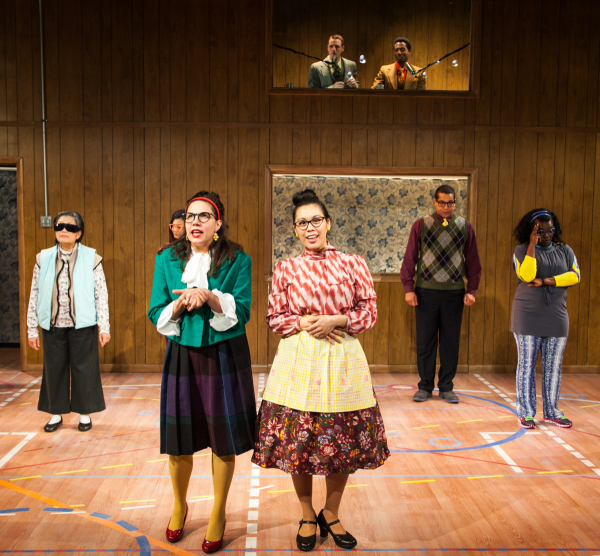A Beautiful Day in November on the Banks of the Greatest of the Great Lakes

(© Heather Phelps-Lipton)
It's the kind of shocked expression that occurs after you see a truly amazing ballgame. The look on your face is a dumb, mouth-agape grin. You're slightly giggling and have the urge to cheer at the top of your lungs. But you're not watching a sports match. You're watching an innovative piece of theater. In Kate Benson's incomparable A Beautiful Day in November on the Banks of the Greatest of the Great Lakes, sport and theater are equated in ways you'd never expect. As directed with a perfectly in-tune idiosyncratic style by Lee Sunday Evans, Benson's debut comedy, a coproduction of New Georges and Women's Project Theater at New York City Center – Stage II, will leave you breathless as it disassembles the time-tested genre of family play.
Thanksgiving is the perfect occasion for a marriage of athletics and drama. After all, how many times have people gotten into arguments between the festive holiday meal and the ritualistic viewing of the annual football game? Her setting is a typical Midwestern home that is about to be infiltrated with many generations of relations. Cheesecake (Brooke Ishibashi, the perfect OCD mom) is in charge; it's her house, after all. Her sisters, Cherry Pie (Heather Alicia Simms) and Trifle (Nina Hellman) join her in the kitchen and dining room. Will they need an extra table to fit everyone comfortably? In that case, they'll also require multiple plates of every dish. They simply cannot have a repeat of the Gravy Boat Episode of 1979. No one has ever forgotten that.
Revelations of secrets are kept to a minimum; instead, the anxieties and rivalries that come with a large family gathering are transmitted through cooking. Everyone knows that no stuffing will ever be as good as the one made by grandma SnapDragon (Mia Katigbak, sharp as a knife), and she, having recently gone blind, has her talons out as she yells at Cheesecake to whisk harder .
It's a little bit like watching LeBron James and the Cavaliers take on the Knicks as this stage-direction-free piece becomes an old-fashioned game of hoops, only one where cooking a juicy turkey and crafting the perfect giblet stuffing replaces the shooting of a basketball into a net. There are no tables or chairs, no food or furniture of any kind, period. Benson and Evans trust that everyone has a Thanksgiving memory that will fill in the blanks.
Of course, we do, miraculously proving that props aren't actually necessary for a fully realized theatrical experience. Instead, we're on a court, all hardwood floors and spike tape, with an announcer's booth high above the action and a pair of commentators (pitch-perfect Ben Williams and Hubert Point-DuJour) who call the action like they see it. Sara C. Walsh's realistically designed set makes the audience spectators in this high-stakes game, while Barbara Samuels' lighting and Brandon Wolcott's sound are exactly the kind you'd see at a massive arena. Kathleen Doyle's 1970s style costumes provide the right amount of kitsch (even though we're largely in the present day).
For what's ostensibly her debut, Benson's writing majorly impresses in its sheer tenacity. This is a 10-actor, nearly two-dozen character work in a style of wild absurdism that has all but died out in favor of conventional four-person shows. She expertly subverts our expectations of gender roles as she takes a world traditionally thought of as feminine (the cooking of a large holiday meal) and places it in a male-dominated idiom of sports. And despite a pleasing lack of preciousness, Benson still manages to find an unexpected tenderness as you realize that the people onstage don't actually set out to hurt each other, despite the occasional sharpness that comes from having to defend your own way of doing something you care deeply about.
If that's not the icing on the cake, try the gleefully demented circle-of-life ending on for size, which is as dark and shockingly pointed as it is truly heartbreaking. It's an absolutely insane way to conclude the piece, but that's not a bad thing. It's a further reminder of how great theater can be when it truly dares to go where it's never gone before.










